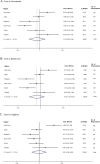Social trust and stress symptoms among older adults during the COVID-19 pandemic: evidence from Asia
- PMID: 35428191
- PMCID: PMC9012251
- DOI: 10.1186/s12877-022-02847-5
Social trust and stress symptoms among older adults during the COVID-19 pandemic: evidence from Asia
Abstract
Objectives: To investigate whether social trust is associated with more stress symptoms among middle-aged and older adults in six East and Southeast Asia regions during the COVID-19 pandemic.
Methods: This multi-region study used cross-sectional survey data collected in May 2020. Participants were a probability-based internet sample of adults aged 55 or older.
Results: Government trust was negatively associated with stress in Singapore and South Korea. Higher levels of health care trust were significantly associated with less stress in Singapore and Taiwan. Trust in neighbors was associated with a higher likelihood of stress in Hong Kong and a lower likelihood in Singapore. Social trust was not associated with stress in Japan or Thailand.
Discussion: Findings suggest the level of social trust in relation to stress substantially varied by region. Interventions to strengthen trust during COVID-19 and other major health crises need to be tailored to fit regions' unique circumstances.
Keywords: Asia; COVID-19; Cross-national survey; Social trust; Stress.
© 2022. The Author(s).
Conflict of interest statement
The authors declare that they have no competing interests.
Figures


References
-
- Banks J, Fancourt D, Xu X. Mental health and the COVID-19 pandemic. World Happiness Rep. 2021;2021:107–130.
Publication types
MeSH terms
LinkOut - more resources
Full Text Sources
Medical

